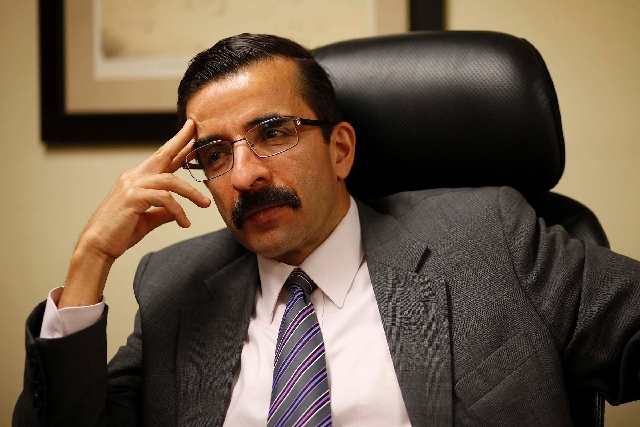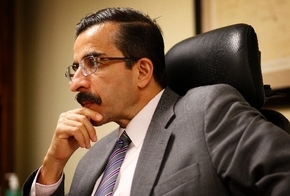New Mexican consul looking forward to U.S. immigration decision


The new Mexican consul for Las Vegas said Tuesday that his office — and the Mexican government as a whole — will respect any decision that Congress makes as it pertains to immigration reform.
And that regardless of the outcome, he’s looking forward to a decision on Capitol Hill, whether issued in weeks or months.
“It’s the position of Mexico to respect the U.S. Congress and its decision — whatever that decision is,” said Julian Adem, who last week was assigned the consulate’s post by Mexico’s Ministry of Foreign Affairs, the equivalent of the U.S. State Department.
“But having said that,” the 53-year-old Adem added, “we would certainly welcome an opportunity for Mexican nationals in the United States to get some sort of adjustment in their status. And in Nevada we would gladly help them with their documents to get the process up and going.”
In his new job, Adem is part everything. He’s part chamber of commerce, part greater economic development in a world of free trade, and part defender of the rights of Mexican nationals living in Nevada, documented or undocumented.
For those unfamiliar with the term, a Mexican national is an immigrant who was born in Mexico and now lives in the U.S.
Adem was sent to Las Vegas to use his fluency in English to protect their interests while promoting Mexico’s image.
Already he is talking to the governor’s office with respect to furthering economic development between Nevada and Mexico, and you will begin to see him around town at various functions.
He said he’s happy to be in Las Vegas, his first time. He said he doesn’t gamble and that he’s “very conservative.” He has a wife and a teenager to look after.
“I look forward to my work here,” said Adem, a mild-mannered man who dresses in suit and tie. He grew up in Coyoacan, a historic village of cobblestone streets just blocks from downtown Mexico City — not much different from Georgetown in its proximity to Capitol Hill.
Adem replaced Mariano Lemus, the former consul who served eight years and has since moved back to Mexico City in a different capacity with the same agency.
In Mexico City, Adem served as the director general for protection of Mexicans abroad. It was his job to make sure that the consulate programs in the United States were up to speed when it came to protecting the rights of Mexican nationals who may have suffered abuse at the hands of U.S. law enforcement.
Before his stint in Mexico City, the nation’s capital, Adem refined his consulate skills by working in Los Angeles and Dallas. The programs in those two major cities are often cutting edge, given their high populations of Mexican nationals. In all, about 12 million Mexican immigrants are believed to be living in the U.S. illegally. While their numbers are hard to pinpoint in Nevada, the range is between 300,000 and 400,000, both legal and illegal, he said.
And it’s his job, as consul, to make sure that these immigrants’ civil rights are not infringed upon while they are here — in accordance with the Vienna Convention on Consular Relations of 1963.
His job is to make life easier for them, in both broad and detailed strokes, which can include talking to funeral parlors and persuading them to lower the rates for the indigent who die here but whose families would like to send them back to Mexico for burial.
That’s just a sliver of the sort of job Adem has — a graphic and sad task that is unavoidable.
His primary duty is to make sure that the Mexican government is aware of all Mexican nationals living here. And often that information is obtained by issuing them “matricula cards” — a form of Mexican identification whose credibility is often far reaching in many U.S. circles, even law enforcement.
In a day and age of terrorism, a form of credible identification is paramount.
Lately, the demand for the matricula card is expected to skyrocket because it’s going to be one of the major prerequisites for obtaining a Nevada driver authorization card. Such cards were designed to allow immigrants living in the U.S. illegally to begin driving legally in the state starting next year. The legislation, Senate Bill 303, was signed by Gov. Brian Sandoval two weeks ago.
“It’s a very humane law. We think it’s a great first step in equalizing the situations among immigrants in the United States,” Adem said.
As many as 1,500 matricula cards are issued to Mexican nationals each month by the Mexican Consulate on Sixth Street in Las Vegas. Just as Nevada’s Department of Motor Vehicles has its rules, so does the Mexican Consulate, Adem said.
For example, he said the consulate has several experts versed in detecting fraud, whether it’s a fake piece of Mexican identification or a birth certificate, both of which are needed to issue a matricula card, along with proof of residence in Nevada.
One unique problem pertains to the birth certificate, another document often required to get such a card. Adem said some Mexican nationals simply do not have records of their birth because they were never registered at local hospitals. This is especially true in the more rural states such as Chiapas and Oaxaca, with their large indigenous populations and language barriers separating them from Mexico’s general populace.
“That’s worst-case scenario, but that phenomenon is passing, and isn’t as prevalent as it was 10 years ago,” Adem said. “But we’re working with Mexican states to make sure such a problem can be resolved.”
Contact reporter Tom Ragan at tragan@reviewjournal.com or 702-224-5512.


















